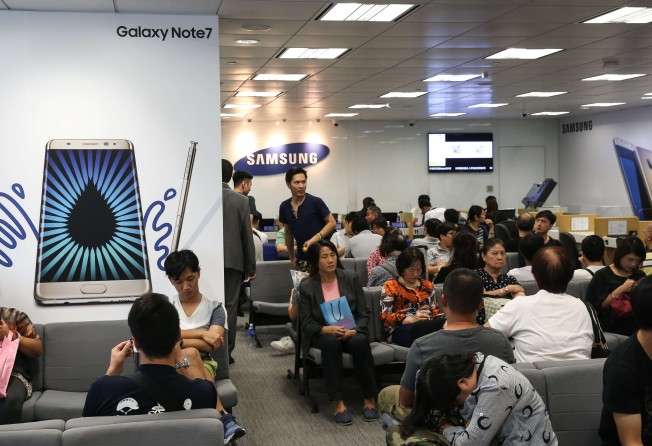Hong Kong government urged keep close eye on Samsung’s disposal of Note 7 phones
The mobile phone manufacturer has yet to reveal how the phones will be disposed of, leaving environmentalists worried that it could cause a e-waste crisis

Environmentalists are urging the Hong Kong government to keep a close watch over how Samsung deals with the disposal of its halted Galaxy Note 7 phone, to avoid an e-waste disaster.
In the long-run, they said, authorities should also include mobile devices in the city’s law that requires manufacturers to recycle and properly dispose of their products.
Their calls come as Greenpeace launched a global petition urging Samsung to be transparent and recycle the 4.3 million Galaxy Note 7s already produced. Some 1.8 million devices have been sold and 100 cases of exploding phones were reported around the world.
Samsung halted the sale and started taking their phones out of circulation on September 2. The world’s largest smartphone maker suspended the Note 7’s production on October 10. But two months after the crisis broke out, the question of what will happen to such devices remains unanswered.
“I urge the government to make a request to Samsung to receive a plan on how they will collect and process the mobiles,” said Edwin Lau Che-feng, founder and executive director of The Green Earth.
“It takes time to develop legislation, but in the long-run, the government should include mobile devices in the ordinance, as smartphones have become part of our daily lives,” he suggested.
The Product Eco-responsibility Ordinance was introduced in July 2008. The regulation provides a legal basis for introducing producer responsibility schemes, but it only covers eight types of electronic and electrical appliances.
Andy Chu-kong, campaigner at Greenpeace in Hong Kong, said: “The Hong Kong government needs to carefully look at the situation ... We need to know where Samsung is going to send the phones and we have to make sure that there won’t be another e-trash tragedy.”
Chu said mobiles should be included in the local law, but even without it, companies must follow sustainable practices. “Samsung has to take up responsibility ... They produced the phone and this has become a global problem,” he said. “ Samsung is most likely proceeding to another environmental disaster ... Dumping and burning the phones is not an acceptable solution,” Chu said.
The Hong Kong government said it would be in contact with the manufacturer.
“The Environmental Protection Department is following up with Samsung’s Hong Kong office to find out details on its recall and disposal plan in Hong Kong. Local disposal, if any, of the bulk quantities of waste batteries will need to comply with the chemical waste controls under the Waste Disposal Ordinance,” a spokesman said. The department also noted it would consider at a later stage reviewing the need to cover legally other electronic equipments, like mobiles.
Greenpeace launched a campaign calling on Samsung to publish its plan for dismantling and disposing of the phones. They want the company to safely process the phones’ harmful substances and reuse the useful materials.
A representative of Samsung in Hong Kong told the Post that “nothing has been decided” and that the company was “still considering on how to proceed.”
Angus Wong Chun-yin, policy advocacy manager of the World Green Organisation, said “the local government should ensure that the mobiles will not end up in a landfill.” The smartphones being collected “have to be properly recycled, as some parts might be toxic to the environment,” he noted.
To include mobile phones in the local regulation “would enhance the responsibility of both producers and consumers,” Wong said. “These days, Hong Kong people are buying new mobile phones every couple of years ... That would be good for Hong Kong and for the environment.”